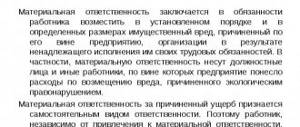The financial liability of the director is enshrined in the Labor Code of the Russian Federation and may arise if he, through his actions or inaction, exposes the company to certain losses. Such losses must be compensated to them in full. Moreover, unlike all other employees, the manager may be required, in addition to direct damage, to compensate the organization, including lost benefits.
Is the director responsible for the firm's debts?
One of the most troubling questions for organizational leaders is the question of whether they should be held liable for the company's debts if the organization does not have the money to pay off its debts.
In most cases, the director, of course, does not have to answer for the company’s debts. However, if the company is in bankruptcy, and it is proven in court that this state of affairs was caused by the actions of the director, he may also be held liable for the company’s debts and pay it if its assets are insufficient.
Such actions, in particular, include:
- Concluding obviously unprofitable deals;
- Concluding agreements without the consent of the company's participants (when required);
- Retaining after dismissal documents that should have been transferred to the founders or the new manager, which entailed adverse consequences for the organization, etc.
It might be interesting!
What to do when you were illegally fired from your job, where to go?
What is the responsibility?
So, the Labor Code defines the following aspects of the employer’s financial liability:
- If his actions or inaction led to the fact that the subordinate is unable to work - Art. 234;
- If the employee’s belongings (property) were damaged – Art. 235;
- If there are unreasonable delays in any payments due to a subordinate or their absence at all - Art. 236;
- Moral damage has been caused - Art. 237.
Now more details.
- The inability to work means quite a lot of concepts . Some of the most common are illegal, i.e., without reason, dismissal or transfer to another position (most often, demotion). Of course, we are not talking about cases provided for by the Labor Code of the Russian Federation.
- Since each employee has personal belongings at the workplace - a telephone, clothes, accessories, a car or a great-great-grandmother’s favorite mug, the manager is also responsible for their safety, because his responsibilities include creating comfortable and safe working conditions for employees. If an incident occurs with damage to any property, the employee must initially contact his superiors in writing with a request for compensation for the damage caused in monetary terms (the amount of compensation depends on the current market prices for an item with the same characteristics) or replacement of the damaged property with the same, but whole. If there is no response within 10 days or if a compromise solution is not found peacefully, you will have to go to court.
- When it comes to wages , the most common violation on the part of directors is delaying wages to employees. By law, workers must receive wages twice a month. Specific numbers are most often regulated by internal acts of the organization. The main thing is that the break between payments does not exceed 15 days.
Vacation pay (when it comes to annual paid leave) is issued no later than 3 working days before the start of the vacation. Sick leave is paid no later than 10 days after providing a document confirming the illness. Payment for maternity leave occurs on the nearest day of payment of wages.
Child care benefits are issued monthly on the day the salaries are transferred to other employees. Upon dismissal, an employee must receive all payments due to him on his last working day.
They are followed in frequency by incorrect or missing entries in work books, which prevent a person from getting another job. This also includes the delay in issuing documents - the same book, income certificate, F 2-NDFL certificate and other documentation that is requested when accepting another place of work.
For such misconduct, the head of the organization must compensate his former employee. Moreover, the daily amount of compensation is equal to the average daily earnings of the dismissed person.
In addition, if the director lost a labor dispute in court proceedings , the Court’s decision has entered into force, and no one is in a hurry to implement it, then the employee also has the right to count on monetary compensation.
Of course, not all delays are directly the fault of the employer. But for the law this no longer matters. A penalty is charged for each day of delay, starting from the moment when the settlement should have occurred, ending with the day when it actually occurred.
During the trial, the date the decision entered into force does not matter; the penalty will continue to accrue until the employer directly fulfills its obligations.
When calculating the amount of compensation, 1/300 of the current refinancing rate of the Central Bank of the Russian Federation will be taken as a basis.
All violations by the employer of the employee's rights inevitably entail all sorts of moral suffering for the latter. Therefore, it is possible to talk about moral harm caused by the head of an organization to his employee. Compensation for moral damage is possible only by going to court and its amount is determined by the same body.
In what cases will it not be possible to hold a director financially responsible?
Natalia
Labor expert
If the organization's losses arose as a result of normal economic risk. For example, when the director fulfilled his obligations properly and took all necessary measures to prevent damage, but subsequently the damage was still caused. If the above facts are duly proven in court, the director will be released from holding him financially liable.
Who is the head of the organization?
The employer, like the employee, is a participant in the labor relationship. It can be any individual (individual entrepreneur, persons required to register and license their activities, etc.) or legal entity (president, director, head of LLC, CJSC, JSC, JSC, etc.).
Moreover, the head of the organization can be a very young person - at the age of 14 years. All activities of the employer, in particular those aimed at company employees, must be within the framework of the labor code.
The boss, in essence, is not only the face of the company and the most important person, but also an employee who is responsible for all the workers working for him and for all the actions performed by them. Can a director be a financially responsible person or not?
The legislation does not divide the financial responsibility of the organization's managers into full or partial (general), as is the case with subordinates. For a manager, compensation for damage caused by his actions, or vice versa - inaction, is always fraught with compensation for damage in full. That is, the director is a financially responsible person.
Moreover, the boundaries of the area for which he is responsible should not be less than the law dictates. This law is the Labor Code, and all the nuances are in Chapter 38.
Does the financial responsibility of directors differ in different companies (LLC, JSC, private security company, municipal unitary enterprise, etc.)?
The Labor Code of the Russian Federation does not divide the financial responsibility of directors of enterprises depending on their organizational and legal forms. Consequently, no matter what kind of organization a particular director manages, he will bear full financial responsibility for the damage that this organization suffers as a result of his unlawful actions.
It might be interesting!
What grounds can there be for officially dismissing an employee?
Types of financial liability
The rules of law provide for the individual responsibility of the director in full, regardless of the nature of his act (Article 277 of the Labor Code of the Russian Federation), this means that he is compensated not only for the actual loss, but also for lost profits.
Article 243 of the Labor Code of the Russian Federation provides for the following cases of application of this type of liability:
- the employee commits intentional harm;
- failure to fulfill direct duties;
- disclosure of personal information;
- shortage of valuables (how to recover the shortage?);
- causing harm in a state of various types of intoxication.
In general, the liability of persons holding management positions is regulated by the Labor and Civil Codes, as well as the relevant federal laws (“On Limited Liability Companies” No. 14-FZ dated 02/8/1998, “On Joint-Stock Companies” No. 208-FZ dated 26.12 .1995).
Reference! Financial liability cannot be reduced by mutual agreement of the parties; it does not depend on the imposition of another type of punishment for this offense.
Divided into:
- Direct damage caused by a manager's action or lack thereof. For example, damage to property.
- Losses incurred by the company. This includes payments to employees for downtime, fines paid due to the fault of the director.
Collection of direct damages is considered by courts of general jurisdiction, and losses - by arbitration courts.
Dismissal is not a significant reason for stopping the manager from being held financially liable (how is liability held?).
More information about what types of financial liability exist is described here, and here you can find out what types of liability exist on the part of the employee and the employer under an employment contract.
Where is it reflected?
Labor relations are necessarily formalized by an employment contract. This document specifies the responsibilities of the parties to the contract. It is there, in the section “Rights and obligations of the parties. Responsibilities of the employer" and sets out the framework of obligations of the head of the enterprise in relation to employees.
Moreover, in contrast to the mandatory conclusion of an agreement on full financial responsibility with an employee, such a measure is not applied with the employer.
A separate document “ Agreement on the financial responsibility of the employer to the employee ” is not provided for by Labor Law and does not exist in principle.
In the agreement with the employee on financial responsibility there is also a mention of the obligations of the head of the organization - in the section “Responsibility of the Parties”. The form of this document is unified and recorded in the 85th Resolution of the Ministry of Labor.
The amount of financial liability can be determined not only by the Labor Code, but also by internal, local acts of the enterprise.
According to them, the amount of compensation payments may be higher than what is provided for by law. But if the acts to which the contract refers reduce the size, then they cannot be considered valid. And in the event of a dispute, the only applicable document is the Labor Code.
Agreement on financial liability with the director - sample.
Administrative/criminal liability for violation of the norms of the Labor Code of the Russian Federation
In continuation of the above, we note that for violating the requirements of labor legislation, the manager can be brought to both administrative and criminal liability.
For example, a manager is subject to an administrative fine in the amount of three thousand to five thousand rubles for failure to fulfill obligations stipulated by a collective agreement or agreement (Article 5.31 of the Code of Administrative Offenses of the Russian Federation).
For violation of the terms of payment of wages and other amounts due to the employee, the manager may be subject to an administrative fine in the amount of one thousand to five thousand rubles (Article 5.27 of the Code of Administrative Offenses of the Russian Federation).
According to Art. 145.1 of the Criminal Code of the Russian Federation, the manager is held criminally liable for non-payment of wages and other payments. Responsibility comes in the form of a fine, or deprivation of the right to hold certain positions or engage in certain activities, or forced labor, or imprisonment. The measure of responsibility depends on the qualification of the act according to Part 1. 1-3 tbsp. 145.1 of the Criminal Code of the Russian Federation.
CHANGE OF GEN. DIRECTORS
Labor law. About the financially responsible person at the enterprise
Who is the financially responsible person at the enterprise?
Irina Fedoseevna
By virtue of the law, all employees, without exception, through whose fault property damage is caused, bear financial responsibility. However, the limits of such liability are not the same for employees. Financial liability in the full amount of damage caused is assigned to the employee on the basis of the Labor Code of the Russian Federation, Federal Laws of the Russian Federation and agreements on full financial liability.
In accordance with Art. 233 of the Labor Code of the Russian Federation, financial responsibility is fully assigned to the employee in the following cases:
1) when, in accordance with the Labor Code of the Russian Federation or other federal laws, the employee is financially responsible in full for damage caused to the employer during the performance of the employee’s job duties; 2) shortage of valuables entrusted to him on the basis of a special written agreement or received by him under a one-time document; 3) intentional infliction of damage; 4) causing damage while under the influence of alcohol, drugs or other toxic substances; 5) damage caused as a result of the employee’s criminal actions established by a court verdict; 6) damage caused as a result of an administrative violation, if established by the relevant government body; 7) disclosure of information constituting a secret protected by law (state, official, commercial or other), in cases provided for by federal laws; causing damage not while the employee was performing his job duties.
2) shortage of valuables entrusted to him on the basis of a special written agreement or received by him under a one-time document; 3) intentional infliction of damage; 4) causing damage while under the influence of alcohol, drugs or other toxic substances; 5) damage caused as a result of the employee’s criminal actions established by a court verdict; 6) damage caused as a result of an administrative violation, if established by the relevant government body; 7) disclosure of information constituting a secret protected by law (state, official, commercial or other), in cases provided for by federal laws; causing damage not while the employee was performing his job duties.
Financial liability in the full amount of damage caused to the employer can be established by an employment contract concluded with the deputy heads of the organization and the chief accountant. Also in accordance with Art. 277 of the Code, the head of the organization bears full financial responsibility for direct actual damage caused to the organization. The list of cases of full financial liability established in Article 243 of the Code is exhaustive, i.e. it cannot be expanded either in local legal acts of the organization or in employment contracts and agreements concluded with employees.
When deciding on the financial liability of an employee for damage caused on the basis of federal law, it is necessary to check for what type of damage such liability of the employee is established and whether he belongs to the category of persons provided for in the relevant law. The obligation of these workers to compensate for damages in full on the basis of federal law occurs regardless of the conclusion of a written agreement with them on full financial liability. For example, in accordance with the Federal Law “On Communications” dated July 7, 2003 No. 126-FZ, telecom operators bear property liability for loss or damage to valuable postal items, or shortage of postal items in the amount of the declared value.
The basis for full financial liability cannot be orders, instructions, regulations and other documents of ministries and departments.
As for agreements on full individual or collective (team) financial liability (clause 2 of part one of Article 243 of this Code), that is, on compensation to the employer for damage caused in full for the shortage of property entrusted to employees, they can be concluded with employees who have reached the age of eighteen years and directly servicing or using monetary, commodity values or other property. Lists of works and categories of workers with whom these contracts can be concluded, as well as standard forms of these contracts, are approved in the manner established by the Government of the Russian Federation.
In accordance with the Decree of the Government of the Russian Federation of November 14, 2002 No. 823 “On the procedure for approving lists of positions and work replaced or performed by employees with whom the employer can enter into written agreements on full individual or collective (team) financial responsibility, as well as standard forms contracts on full financial liability”, the Ministry of Labor of Russia, by resolution of December 31, 2002 No. 85, approved the List of positions and work filled or performed by employees with whom the employer can enter into written agreements on full individual financial liability for shortages of entrusted property; Standard form of an agreement on full individual financial liability; A list of works during the performance of which full collective (team) financial liability for the shortage of entrusted responsibility may be introduced; A standard form of an agreement on full collective (team) financial liability.
The List of Positions includes:
- cashiers, controllers, cashier-controllers (including senior ones), as well as other employees performing the duties of cashiers (controllers); — managers, their deputies, specialists and other employees engaged in depository activities; examination, authentication and other verification, as well as destruction in the prescribed manner of banknotes, securities, forms issued by a credit or other financial organization and/or the Ministry of Finance of Russia; transactions for the purchase, sale, permission to pay and other forms and types of circulation of banknotes, securities, precious metals, coins made of precious metals and other currency values; cash transactions when servicing ATMs and servicing clients who have individual safes in the vault, accounting and storage of valuables and other property of clients in the vault; operations for the issue, accounting, storage, issuance and destruction of bank, credit, discount cards, cash and other financial services to customers, for counting, recalculating or generating cash and currency values; collection functions and transportation (transportation) of cash and other valuables (including collection drivers), as well as other employees performing similar functions; - directors, managers, administrators (including senior, chief), other heads of organizations and divisions (including sections, reception centers, departments, halls) of trade, catering, consumer services, hotels (camping sites, motels), their deputies , assistants, sellers, commodity experts of all specializations (including senior, chief), as well as other employees performing similar functions; heads (managers) of construction and installation shops, sites and other construction and installation departments, work producers and foremen (including senior, chief) of construction and installation work; - managers, other managers of warehouses, storerooms (points, departments), pawnshops, storage rooms, other organizations and divisions for the procurement, transportation, storage, accounting and issuance of material assets, their deputies; managers of households, commandants of buildings and other structures, storekeepers, wardrobe maids; senior nurses of healthcare organizations; procurement and/or supply agents, transportation forwarders and other employees who receive, procure, store, record, issue, and transport material assets; — managers and other managers of pharmacy and other pharmaceutical organizations, departments, points and other divisions, their deputies, pharmacists, technologists, pharmacists; — laboratory assistants, methodologists of departments, dean’s offices, heads of library sectors.
Along with the list of positions filled by employees with whom the employer can enter into written agreements on full responsibility for shortages of entrusted property, the Russian Ministry of Labor approved a list of works, the performance of which is directly related to the maintenance of inventory and provides grounds for concluding such agreements. This List includes the following types of work:
— acceptance and payment of all types of payments; for settlements during the sale (sale) of goods, products and services (including not through a cash register, through a cash register, without a cash register through a seller, through a waiter or other person responsible for making payments); servicing vending and cash machines; for the production and storage of all types of tickets, coupons, subscriptions (including subscriptions and food vouchers and other signs (documents) intended for payments for services; - related to the implementation of depository activities; examination, authentication and other verification , as well as destruction in the prescribed manner of banknotes, securities, forms issued by a credit or other financial organization and/or the Ministry of Finance of Russia; transactions for purchase, sale, permission to pay and other forms and types of circulation of banknotes, securities, precious metals, coins made of precious metals and other currency values; transactions with cash when servicing ATMs and servicing clients with individual safes in the vault, accounting and storage of valuables and other property of clients in the vault; operations on the issue, accounting, storage, issuance and destruction of bank, credit, discount cards, cash and other financial services to clients, for counting, recalculating or generating cash and currency values; collection functions and transportation (transportation) of funds and other valuables; - for the purchase (reception), sale (trade, release, sale) of services, goods (products), preparing them for sale (trade, release, sale); - on acceptance for storage, processing (manufacturing), storage, accounting, release (issuance) of material assets in warehouses, bases, storerooms, points, departments, sites, in other organizations and divisions; for the issuance (reception) of material assets to persons staying in sanatorium-resort and other medical and preventive organizations, boarding houses, campsites, motels, holiday homes, hotels, hostels, rest rooms on transport, children's organizations, sports and recreational and tourist organizations, in educational organizations, as well as passengers of all types of transport; on equipment of passenger ships, carriages and aircraft; - for accepting cultural and household items and other material assets from the population for storage, repair and for performing other operations related to the manufacture, restoration or improvement of the quality of these items (valuables), their storage and other operations with them; for the rental of cultural and household items and other material assets to the population; — for the reception and processing for delivery (escort) of cargo, luggage, postal items and other material assets, their delivery (escort), issuance (delivery); - for the purchase, sale, exchange, transportation, delivery, forwarding, storage, processing and use in the production process of precious and semi-precious metals, stones, synthetic corundum and other materials, as well as products made from them; — on growing, fattening, keeping and breeding farm and other animals; — for the production, processing, transportation, storage, accounting and control, sale (purchase, sale, supply) of nuclear materials, radioactive substances and waste, other chemicals, bacteriological materials, weapons, ammunition, components for them, explosives and other products (goods) prohibited or restricted for free circulation.
The list of positions has intersectoral significance. Therefore, for example, an agreement on full financial responsibility can be concluded with store managers and their deputies, regardless of the departmental affiliation of the trading enterprise. However, this agreement cannot be concluded, for example, with a head nurse or a pharmacy manager working in social security institutions and organizations.
The categories of workers and types of work included in the list are not subject to broad interpretation. Therefore, it is impossible, for example, to conclude the specified agreement with the hotel duty officer, the foreman of the canteen cleaners, etc.
The list of positions and works is not subject to interpretation. When combining professions (positions), an agreement can be concluded with the employee if the list includes the main or combined profession (position).
An employee who has entered into an individual liability agreement with an enterprise bears full responsibility for ensuring the safety of those valuables that he personally received according to an invoice or other accounting document, despite the fact that in some cases other persons also have access to these valuables.










